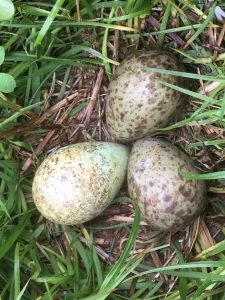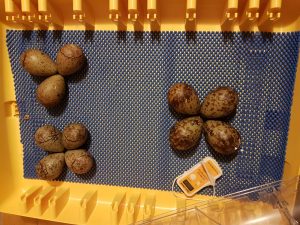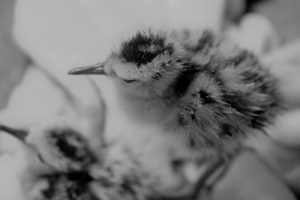Headstarting

2019 was the third year of headstarting for Curlew Country. This year a chick from its pioneering headstarting trial carried out in 2017, returned to the Curlew Country landscape close to both the site at which it was reared and where it was released at Dolydd Hafren. This is the first chick in the UK known to have survived its initial winter roost of two years and to return to its pre-fledging area. 2019 also brought a new partnership with the Wildfowl and Wetlands Trust (WWT), as well as support from Chester Zoo, to further our avicultural knowledge and increase the egg to fledge ratio. In all aspects of our work the welfare of the birds is of utmost priority and is taken into careful consideration during each step of the process.
Egg Collection

The licence provided by Natural England allows us to hold up to 50 eggs at any one time, it was agreed that with WWT we would collect 45 eggs for incubation this season. This number was reached after careful consideration of how many chicks could be safely accommodated whilst also allowing for some probable losses. WWT provided new upgraded incubators as well as 2 headstarting assistants to help with the project. Eggs were collected in the field by ornithologist Tony Cross and field assistant Tim Lewis, after surveying known curlew territories for nesting behaviour. If an incomplete clutch was found, the eggs would be swapped for dummies until all eggs could be harvested. The entire clutch would then be removed allowing the pair to fail, and potentially try again.
Incubation

The eggs took around 27 days to reach external pipping stage, and then another 3 days to hatch. The incubation process was carefully monitored by the WWT headstarting assistant, Rosemary Drew, 3 eggs were returned to a wild nest at pipping stage, and of the remaining 42 eggs 37 chicks hatched. Eggs were candled regularly during incubation to check their progress and allow any dead eggs to be removed, reducing the risk of infecting other eggs.
Chick Rearing

The chicks were kept inside for the first 6 to 7 days, before going into their outside pens. They were gradually given more space to explore and forage and took to hunting and probing quite naturally. They were provided with heat and shelter until they began practicing flight, at which point these were removed to prevent any possible collisions. Water and food were also provided and were changed regularly to ensure It was fresh and clean. All of the young curlew were fitted with colour rings so that they might be easily identified. The rings consist of an orange on one leg, and a yellow ring with a two-letter code on the other. We would like any sightings of colour ringed curlew, please send them to us or directly to avcross@btinternet.com.
Release

The chicks were due to be released at fledging stage, originally on multiple dates when different ages of chicks were ready. However, on the first of these dates the surrounding fields had still not been cut, and the decision was made to delay release to allow more time for cutting to take place. This meant that all 33 chicks were released on the 29th July, at 10am. A small group of those who have helped the project were invited to watch from a distance, whilst the sides of the pen were taken down to let the young birds walk out and explore their wider surroundings.
Natural Nest Success
Some nests were monitored in the area that did not have their eggs collected but were instead protected by an electric fence. With this knowledge and through observations and anecdotal evidence we believe that between 3 and 4 chicks fledged successfully from natural nests this year.
Funding
Before the season started in earnest the project spent much of its time trying to secure funds for the forthcoming year. As the season loomed the project launched an urgent appeal to the public. Through this appeal we have raised over £20,000, which has allowed us to draw down match funding from the Whitley Animal Protection Trust and bring our total in excess of £40,000. We are extremely grateful to everyone who has donated, or fundraised for the project, allowing our vital work to continue. We are now trying to secure funding for the future. We are keen to see how many of our 21 chicks released in 2018 will return to the landscape in which they were reared and released.
Curlew Summit

Lord Randall, Theresa May’s special advisor on the environment, hosted a Curlew Summit at No.10 Downing Street. This came about as a result of Mary Colwell Hector’s work as Curlew Champion. The 3 elected curlew champions: Mark Isherwood, Welsh AM, Jake Berry, MP and Lewis Macdonald MSP attended along with representatives from Defra and Natural England. Project Manager Amanda Perkins and Consultant Ornithologist Tony Cross both attended. The presentations on a range of issues reflected the important findings from trial recovery work carried out by the Curlew Country project during the past 5 years. All hoped to achieve realistic support toward a sustainable future for curlews and the many additional environmental benefits that managing for them would deliver.

